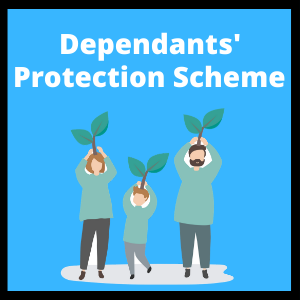The Dependants’ Protection Scheme (DPS) has just crashed landed into your hands.
What is it all about?
Should you retain it? Is it enough?
Today, we take a deeper look at this scheme, and the reasons why it’s good (and its limitations).
Note: This article has been updated to reflect the new changes effective 1 April 2021.
Read on!
What Is the Dependants’ Protection Scheme?
The Dependants’ Protection Scheme (DPS) was privatised on 17 September 2005 and is currently offered to CPF members only.
It is a form of term life insurance that provides some protection to those who are insured under the scheme.
Is it compulsory? No.
DPS is a scheme that you can opt out from. But should you? Read through this article and you’ll get your answer.
SIDE NOTE When was the last time you conducted thorough financial planning or reviewed your finances? In this day and age in Singapore, doing so will absolutely improve the quality of life for you and your loved ones. Here are 5 reasons why financial planning is so important.
The Coverage of DPS
When you’re insured under DPS, you’ll be covered for a maximum of $70,000 up to age 60. The maximum sum assured then reduces to $55,000 for members age 60 to 65.
Insured events:
- Death
- Terminal Illness
- Total and Permanent Disability
You can be covered worldwide.
The coverage ends after age 65, but if any of insured events happen before that, there will be a payout to the insured member or their families.
When Are You Automatically Enrolled
When you fulfil certain criteria, you’ll be automatically enrolled into DPS.
Here are the criteria:
- Singapore Citizen or Permanent Resident
- Between Age 21 and 65
- Made your first CPF contribution
But if you’re between the age of 16 and 21, you can also manually apply to be included.
There’s Only 1 Administrator for DPS
As the scheme is privatised, currently only one insurance company is appointed to administer the scheme, and that’s Great Eastern (GE).
Once you’re automatically enrolled, you would receive a welcome package in the mail from GE.
Prior to 1 Apr 2021, NTUC Income was the other administrator, but they have since transferred their obligations to Great Eastern, and GE will handle all DPS matters from now on.
If you were assigned to NTUC Income previously, you don’t need to do anything, however, you might need to submit a new nomination form to GE.
The Premiums for DPS
Here are the premiums for DPS:
| Age | New Yearly Premium (After 1 April 2021; for $70,000) | Old Yearly Premium (Before 1 April 2021; for $46,000) |
|---|---|---|
| 34 years and below | $18 | $36 |
| 35 – 39 years | $30 | $48 |
| 40 – 44 years | $50 | $84 |
| 45 – 49 years | $93 | $144 |
| 50 – 54 years | $188 | $228 |
| 55 – 59 years | $298 | $260 |
| 60 – 64 years | $298 (for $55,000) |
Generally, with the new changes, you’ll get higher coverage at a lower premium.
Take note that the premiums increase with age band so it doesn’t mean that if you entered early, the premium will be locked in.
Apart from the Home Protection Scheme (HPS), the Dependants’ Protection Scheme is also another life insurance plan that can be paid using CPF monies.
(Other national schemes that you can use your CPF monies to pay: MediShield Life, Integrated Shield Plan, ElderShield, and CareShield Life.)
By default, premiums will be deducted from your CPF Ordinary Account first. If there isn’t a sufficient balance, then a deduction will be made from your CPF Special Account. And if that still can’t be deducted, a cash payment can be made.
As the DPS is meant to be an individual scheme, the premiums can only be paid from your own CPF account. If you wish for your parents or spouse to be covered, you can’t pay their premiums using your CPF monies. It has to be from their own accounts.
DPS Has No Cash Value
As DPS is still a term insurance, it does not accumulate cash value.
Term insurance is designed to provide the highest coverage at a low premium.
Simply put, you pay the premium to enjoy getting covered.
Therefore, if you don’t wish to have the cover anymore, you can opt out from it. You’re still able to rejoin again in the future but will likely to be subjected to underwriting.
All in all, if you’ve paid the premiums till you’re 65 years old and nothing happens, you’ll not have any refunds or get anything back.
But that’s also a good thing because you’ve enjoyed good health throughout those years.
How to Check If You’re Insured Under DPS
Steps to check whether you have DPS:
- https://www.cpf.gov.sg/eSvc/Web/PortalServices/WelcomePage
- Login with your SingPass
- Click on “My Messages” on the left panel
- Scroll down to “Insurance”
- and you should see the below picture.

If you’re insured under DPS, you’re able to see the section (last picture).
If you’re not insured under DPS, that section will be empty.
On Pre-Existing Conditions and Illnesses
Like any other insurance, you’ll need to declare your health by submitting a health declaration form.
This health declaration form is required for both first-time applicants and re-joiners.
The application is subjected to approval, and depending on your current health, you may still get deferred or declined.
For those who were transferred from NTUC Income because of the 1 April 2021 changes, you don’t need to declare your health again. Also, Great Eastern will continue to cover new conditions that had developed on or after commencement of your DPS under NTUC Income.
Here are the list of serious conditions that may restrict you from getting coverage:
| S/N | Serious Illnesses |
| A | Ischaemic heart disease/Coronary heart disease, heart valves disorders or arrhythmia (irregular heartbeats) |
| B | Cancer |
| C | Stroke/Cerebrovascular disorders, tumour of the brain or Arteriovenous Malformation |
| D | Renal failure or renal dialysis |
| E | Diabetes with complications |
| F | Chronic liver disorders, liver cirrhosis, hepatic encephalopathy or liver failure |
| G | AIDS/HIV infection |
| H | Dementia/Alzheimer’s disease |
| I | Severe psychiatric or mental illness |
| J | Motor neuron disease |
| K | Muscular dystrophy |
| L | Paralysis (Hemiplegia/Paraplegia/Quadriplegia) |
| M | Chronic lung disease |
| N | Rheumatoid arthritis with complications |
| O | Multiple sclerosis |
| P | Systemic lupus erythematosus with complications |
| Q | Parkinson disease with complications |
| R | Pulmonary hypertension |
| S | Aplastic anaemia, Thalassaemia major or severe blood disorders |
| T | Any illness, excluding those mentioned from (A) to (S), which is likely to lead to a limb/spinal/eye/mental condition |
| U | Any other illness, excluding those mentioned from (A) to (T), which is certified by a medical practitioner registered under the Medical Registration Act to be a serious illness |
DID YOU KNOW? According to a survey conducted by MoneySense, about 3 out of 10 Singapore residents aged 30 to 59 had not started planning for their future financial needs. This isn't surprising because personal finance can seem complicated and daunting. But really, there are only a few things that you should focus on. Learn how to significantly improve your personal finances with the 7-step "wedding cake" strategy today.
You Can Also Make a Nomination
Take note that a nomination applies only for the death claim benefit as it goes to your nominated parties.
If a terminal illness or total permanent disability happens, the payout will be to the insured member instead.
By having a nomination, the process of claiming will be easier for your family.
If you’ve already made a CPF nomination, it doesn’t apply to DPS as they’re separate. Therefore, you’ll still need to submit a nomination form to Great Eastern.
In case you wish to change the nomination in the future, you can still do so by submitting a new form.
If you’ve made a nomination under NTUC Income prior to 1 April 2021, you will need to make a new one to Great Eastern.
Making a DPS Claim
DPS covers Death, Terminal Illness and Total and Permanent Disability.
But what constitutes to an eligible claim?
Here are the claim definitions:
Terminal illness: an illness that a registered medical practitioner under the Medical Registration Act certifies is expected to result in death within 12 months.
Total permanent disability:
(i) the inability to take part in any employment permanently; or
(ii) the total permanent loss of physical function of both eyes, both limbs, or one eye and one limb.
(If you’re interested, you can take a look at our study on life insurance claim statistics in Singapore.)
But there are exclusions too.
DPS benefits will not be payable if the following happens in the first year:
- member committed self-inflicted injury or suicide,
- member committed a criminal offence punishable by death, or
- the claim arose out of member’s own intentional criminal act.
DPS will also not be be payable if:
- member was not in good health before the commencement of DPS cover,
- member provided false or misleading information, or
- the claim arose from wars or any warlike operations or participation in any riot
When there’s an eligible claim, you will need to approach Great Eastern and submit the necessary claim forms and documents.
3 Reasons to Stick With DPS
Overall, there are good reasons to stick with the scheme.
Here are 3 of them:
1) Premiums are affordable
For the maximum coverage of $70,000, the premium is relatively small in the lower age band. It’s something that will not break the bank. As long as you’re working, you shouldn’t have any problems paying the premiums.
2) Ability to use CPF monies
With cash, there are no limitations to what you can use it for. But for CPF, there are many. For DPS, at least you can use your CPF OA and SA funds to pay for the premiums. It enables you to save your cash for other commitments.
3) Provides some form of protection
When you start working, your income becomes vital to you and your family. DPS offers some form of “compensation” if an adverse event happens. And as it’s automatically enrolled, you don’t have to go through the hassle to apply.
The 1 Downside of DPS
Coverage may not be enough.
As DPS is a national scheme, it’s meant to provide the basic needs of everyone. At least, everyone would have something.
But in most cases, a $70,000 payout might not be enough when you factor in the permanent loss of income.
What happens after the payout is used up? Where would you find the money for ongoing expenses?
Therefore, if you’re contributing an income to the family, it’s important to protect that income from disasters.
And one more thing: DPS does not cover critical illness which can have a high probability of happening.
If you don’t know how much you should be covered, take a look at our life insurance calculator.
And if you wish to further protect yourself and your family, you can consider term insurance or whole life insurance. Also check out the differences between whole life and term insurance.
Conclusion
Should you opt out of DPS?
If you’re young, the premiums are very low and insignificant. You may as well keep it since you’re not using cash.
But in my opinion, that shouldn’t be the main consideration.
DPS is meant to provide some form of protection. And that “some” could translate to “inadequate”.
To most, DPS is the first ever life insurance they’ve gotten on their own, although sometimes unknowingly.
But if you’re at a stage where you want to explore proper financial protection, you can first estimate how much life insurance to cover. Then perhaps, take a look at other options such as term plans or whole life plans.


